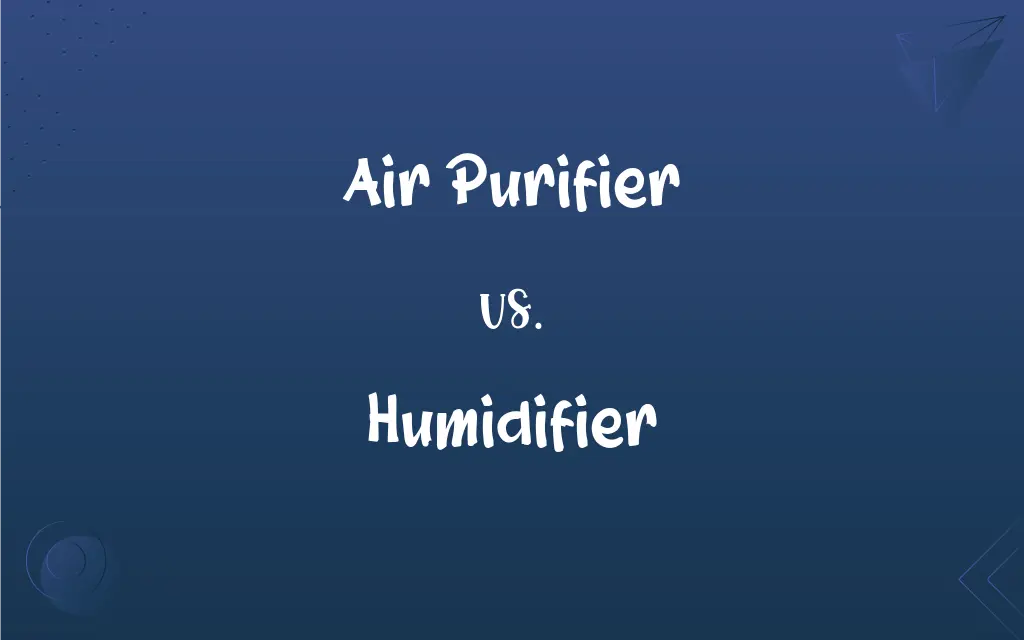Air Purifier vs. Humidifier: What's the Difference?
Edited by Harlon Moss || By Janet White || Updated on November 18, 2023
An air purifier removes contaminants from the air, while a humidifier adds moisture to the air to maintain humidity.

Key Differences
An air purifier is a device designed to cleanse the air, removing particles like dust, pollen, and bacteria. On the other hand, a humidifier is specifically meant to increase the moisture content in the air, ensuring the environment doesn't become too dry.
The primary function of an air purifier is to improve air quality by filtering out pollutants and allergens. This can be beneficial for those with allergies or respiratory issues. Conversely, a humidifier combats dryness in the air, which can be helpful in preventing dry skin, throat irritation, and other related issues.
Air purifiers often use filters, such as HEPA filters, to trap unwanted particles. Some even have UV lights or ionizers to kill microorganisms or make particles easier to filter. In contrast, humidifiers release water vapor or steam into the air, using methods like ultrasonic vibration or evaporation.
While air purifiers mainly focus on health by reducing airborne contaminants, humidifiers cater to comfort by addressing issues that arise from dry conditions, such as static electricity or wooden furniture cracking.
It's possible to find devices that combine both air purifier and humidifier functions, but it's essential to understand their distinct roles. While air purifiers cleanse, humidifiers moisturize.
ADVERTISEMENT
Comparison Chart
Purpose
Removes contaminants
Adds moisture
Benefit
Improves air quality
Combats dry air
Mechanism
Uses filters or ionizers
Releases water vapor
Main Focus
Health
Comfort
Usage
Beneficial for allergies
Helpful in dry conditions
ADVERTISEMENT
Air Purifier and Humidifier Definitions
Air Purifier
A tool that enhances breathable indoor air by removing impurities.
Smokers often use air purifiers to reduce the smell of smoke indoors.
Humidifier
A device that increases humidity in a room.
Winters can get very dry, so they use a humidifier in their bedroom.
Air Purifier
An appliance that reduces the concentration of airborne contaminants.
Investing in a good air purifier can greatly improve indoor air quality.
Humidifier
An appliance that adds moisture to indoor air.
A humidifier can prevent skin from becoming too dry in heated homes.
Air Purifier
A gadget that captures particulate matter from the atmosphere.
Her allergies improved once she started using an air purifier in her bedroom.
Humidifier
A machine that emits water vapor to raise the air's humidity level.
When she felt a sore throat coming on, she turned on her humidifier.
Air Purifier
A machine that filters and cleans circulating air.
After getting an air purifier, they noticed a significant reduction in dust.
Humidifier
A tool that maintains or increases air moisture content.
Having a humidifier in the nursery can help babies breathe more comfortably.
Air Purifier
A device that eliminates pollutants from indoor air.
Many asthma patients benefit from using an air purifier in their homes.
Humidifier
A gadget designed to combat dryness by releasing moisture.
Musical instruments can benefit from a room with a humidifier, preventing them from drying out.
Humidifier
A device for increasing the humidity in a room, greenhouse, or other enclosure.
Humidifier
A device that is used to increase the humidity of the air.
Humidifier
A device that increases the moisture content of the air; - used to avoid excessive dryness in buildings, which can cause irritation to the throat. Compare dehumidifier.
FAQs
Does an air purifier help with allergies?
Yes, an air purifier can remove allergens from the air, reducing allergy symptoms.
Can a humidifier help with skin dryness?
Yes, a humidifier can prevent skin from getting too dry by adding moisture to the air.
Do humidifiers promote mold growth?
If not cleaned regularly or if used excessively, they can increase mold risk.
Can an air purifier and a humidifier be used together?
Yes, an air purifier can cleanse the air while a humidifier maintains moisture levels.
Can an air purifier help asthma sufferers?
Yes, by removing triggers like dust and pollen, it can aid asthma patients.
When is a humidifier most beneficial?
During dry seasons or in heated indoor spaces where the air lacks moisture.
Can an air purifier reduce pet dander?
Many air purifiers are effective at capturing and reducing pet dander.
Can an air purifier eliminate smoke?
Many air purifiers can reduce smoke particles and odor from the air.
Is distilled water preferred for humidifiers?
Yes, distilled water reduces mineral deposits and potential white dust.
How often should air purifier filters be replaced?
It varies by model, but generally every 6-12 months for optimal performance.
Can using a humidifier help with cold symptoms?
Yes, it can alleviate dry throat and nose, often associated with colds.
Do air purifiers make a room cold?
No, they clean the air but don't change its temperature.
What's the ideal position for an air purifier in a room?
It's often best placed near pollutant sources but not obstructed, allowing free airflow.
Are there air purifiers that also humidify?
Yes, combination units that purify and humidify are available.
Do all air purifiers use filters?
While many do, some use technologies like ionizers or UV lights instead.
Can an air purifier remove viruses?
Some with HEPA filters or UV lights can capture or neutralize certain viruses.
Can a humidifier help with snoring?
Yes, by moisturizing airways, it can reduce snoring caused by dryness.
How does a humidifier benefit respiratory health?
It keeps airways moist, reducing irritation from dry air.
Should a humidifier run all day?
Not necessarily, it's best to use it as needed based on humidity levels.
Do humidifiers consume a lot of energy?
Generally, they are energy-efficient, but consumption varies by model and usage.
About Author
Written by
Janet WhiteJanet White has been an esteemed writer and blogger for Difference Wiki. Holding a Master's degree in Science and Medical Journalism from the prestigious Boston University, she has consistently demonstrated her expertise and passion for her field. When she's not immersed in her work, Janet relishes her time exercising, delving into a good book, and cherishing moments with friends and family.
Edited by
Harlon MossHarlon is a seasoned quality moderator and accomplished content writer for Difference Wiki. An alumnus of the prestigious University of California, he earned his degree in Computer Science. Leveraging his academic background, Harlon brings a meticulous and informed perspective to his work, ensuring content accuracy and excellence.































































